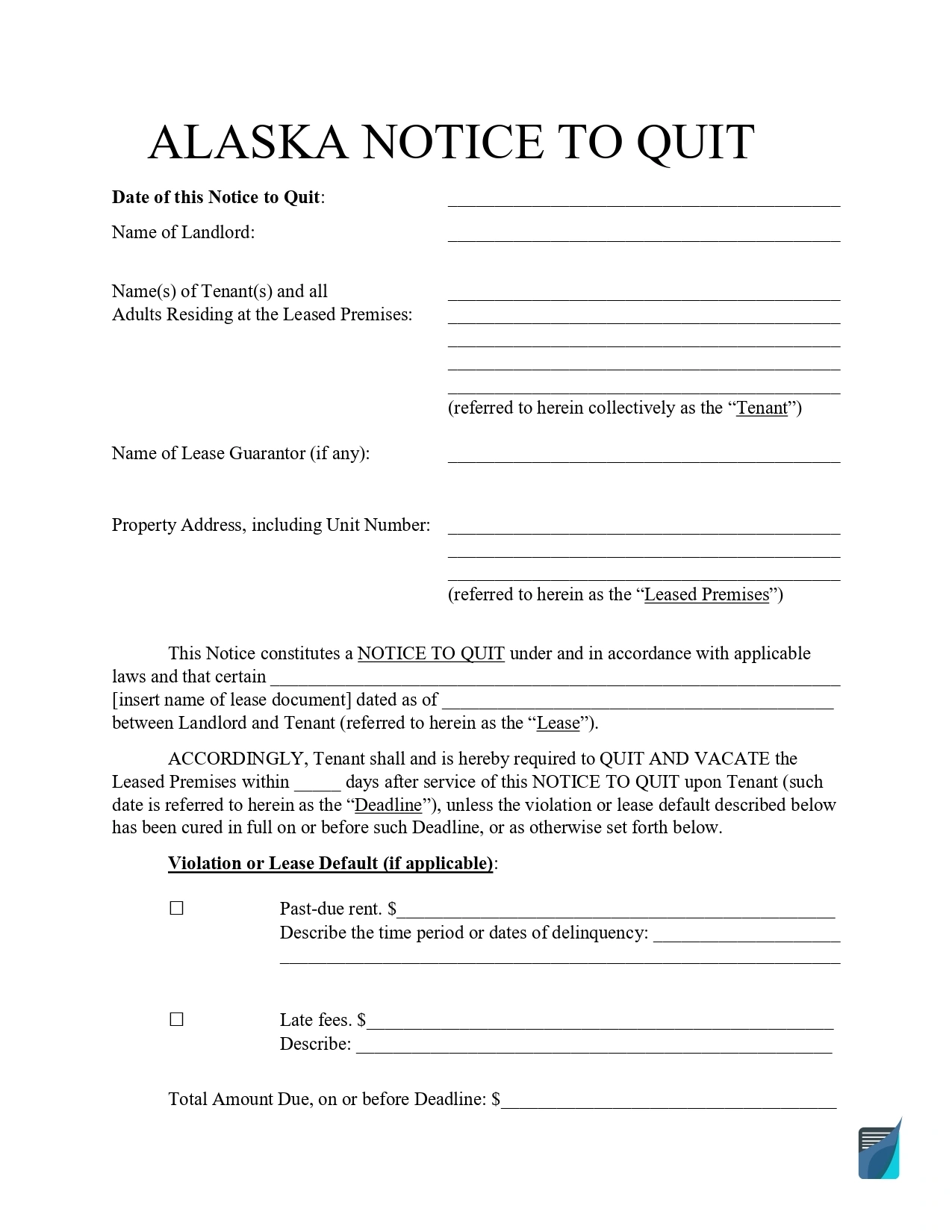Alaska Eviction Notice Forms
The Alaska eviction notice is a legal form landlords use to notify tenants that they violate their rental agreement and that the landlord intends to terminate the lease if the issue isn’t resolved. This notice is the first step in eviction and must comply with Alaska’s landlord-tenant laws.
This document clearly states the reason for eviction, the remedy (if applicable), and the timeline the tenant has to resolve or vacate the property. A completed and signed eviction notice template must also be delivered as prescribed by law, such as personal delivery or posting at the property when direct delivery is impossible.

Build Your Document
Answer a few simple questions to make your document in minutes
Save and Print
Save progress and finish on any device, download and print anytime
Sign and Use
Your valid, lawyer-approved document is ready
Alaska Eviction Laws
Alaska’s eviction laws outline specific procedures landlords must follow to legally evict a tenant, protecting both parties’ rights throughout the process. The foundation of these laws revolves around providing adequate notice and the legitimate grounds for eviction, which include nonpayment of rent, violation of lease terms, and the expiration of the lease term. In each case, Alaska statutes mandate that landlords provide a written notice as the first step in eviction.
Under Alaska Statutes, Section 09.45.100, a notice to quit can be delivered to a tenant through several authorized methods:
- It may be sent via registered or certified mail with a return receipt,
- Hand-delivered directly to the tenant,
- Left at the premises if the tenant is not present.
Under Section 34.03.220 of Alaska Statutes, landlords can address tenant noncompliance in various scenarios. For severe issues like substantial property damage or illegal activities, landlords can issue a quick eviction notice, demanding tenants vacate within 24 to 5 days.
For other lease violations affecting health and safety, tenants receive a 10-day notice to remedy the breach or face eviction. Rent-related evictions proceed after a 7-day notice if rent remains unpaid. The statute also details the rights to partial rent payments and the consequences of utility discontinuance, emphasizing tenant responsibilities and landlord rights to maintain property standards and recover damages.
Alaska Eviction Notice Laws Details
| Rent Grace Period | Not Defined |
| Notice of Non-Payment | 7 days |
| Notice of Non-Compliance | 10 days |
| State Laws | Alaska Statutes, Section 34.03 |
Eviction Notice Types Used in Alaska
Several eviction notices are employed in Alaska, each corresponding to different situations.
7-day Notice
This notice is employed for rent arrears. It gives tenants a week to pay the overdue amount. If the tenant fails to pay within this timeframe, the landlord may proceed with eviction actions to regain possession of the property.
10-Day Notice
Used for violations of lease terms other than rent nonpayment, this notice allows tenants ten days to correct the issue. If the problem is not remedied, it may lead to eviction proceedings based on the breach of contract.
30-Day Notice
Applicable for ending month-to-month tenancies. This notice informs tenants that the landlord will not renew the lease, giving them 30 days to find alternative accommodation and vacate the property.
24-Hour Notice
This notice demands tenants vacate within 24 hours in cases of substantial property damage. It is used when severe damages warrant immediate eviction to prevent further loss or disruption.
5-Day Notice
This notice is for illegal activities on the premises, providing five days for the tenant to leave. It’s used when tenant actions violate laws, posing serious liabilities to the landlord or other tenants.

Eviction Process in Alaska
In Alaska, eviction is formally called “Forcible Entry and Detainer” (F.E.D.). This process is employed when tenants fail to comply with their rental agreements for reasons such as non-payment of rent, substantial damage to property, or illegal activity on the premises.
Court-Ordered Eviction
It’s important to note that evictions must be conducted legally through court proceedings. Landlords cannot forcibly evict tenants by changing locks or physically removing them. The eviction must be sanctioned by a court order.
Phases of the Eviction Process
The eviction process in Alaska is divided into two phases:
- The first, the Possession Phase, involves a swift court hearing to determine if the tenant should be evicted.
- The second, the Damages Phase, deals with any financial disputes between the landlord and tenant, such as unpaid rent or costs for property damage.
If the court rules in favor of the landlord, a writ of eviction is issued, and the tenant must vacate the property.

Use our document builder to customize any template on FormsPal to your preferences. Here is a number of some other widely-used Alaska forms we provide.